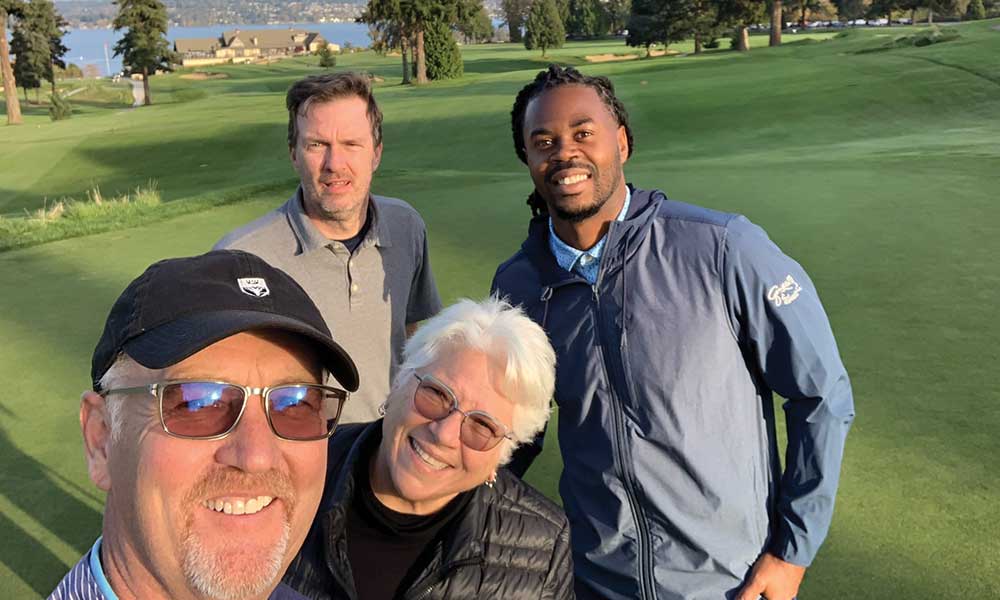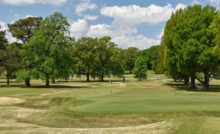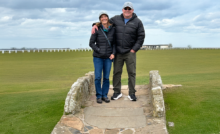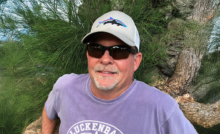

From Left to Right - David McLay Kidd, Tony Dear, Anni Shelley & Sydney Rice at Sand Point Country Club in Seattle
This column features recollections of the author’s 34 years as a golf writer. These installments stem from his many travels and experiences, which led to a gradual understanding that the game has many intriguing components, especially its people.
I’ve been fortunate to have met and worked with many golf writers over the years. Chance encounters involved legends (Hall of Famers Dan Jenkins and Mario Parascenzo). Others came when I was managing editor of four print magazines and as Cybergolf’s editorial director, where I assigned articles from over 100 scribes around the world. Among these are two gents who now write for this magazine, Jay Flemma and Andrew Penner.
Cybergolf enjoyed a broad spectrum of contributors, including club pros (Dave Castleberry, Dave Fischer and Ron Stull, to name a few); college coaches (Matt Thurmond, Tim Bibeau, Casey Martin, et al); instructors (Bob Boldt, Kiran Kanwar, J.D. Cline, Billy Bondaruk, Charlie Schaubel, and Bob Duncan); book authors (David Wood, Blaine Newnham, Chris Duthie, George Fuller, Joel Zuckerman, and Richard Voorhees); health practitioners (Dr. Divot, yoga instructor Melina Meza, etc.). I created a robust section on Cybergolf called “Architects Corner” that ran pieces penned by or featured golf course designers such as Jeffrey Brauer, Dan Hixson, Drew Rogers, John Fought, David McLay-Kidd, Gil Hanse, Tripp Davis, and others.
I also made sure that Cybergolf represented a female’s point of view. Two contributors to its “Women’s Golf” section have since moved on to bigger and better things. The website was among the first to offer stories by Elisa Gaudet, who later founded Women’s Golf Day, now an international entity that helps draw ladies into the sport. In 2020, Elisa had grown the organization into one that hosted events at 900 locations in 68 countries. An attorney by trade, Nancy Berkley has been a longtime promoter of the LPGA Tour and written many tracts about the inequities women face in golf, on and off the course. The Floridian continues to press for inclusiveness within the industry.
One Writer Stands Out
As with any relationship, some editor-writer exchanges are better than others. Though I always sought to ensure stories were in prime shape for publication, there were a few knotty interactions, which are inevitable in this trade. As a writer who has wrangled with book and magazine editors over the years, I certainly understand when the shoe is on the other foot. Yet most scribes were professionals who appreciated my tweaks to their stories.
One in particular – Tony Dear, showcased here – occasionally disputed my alterations. In fact, his insistence with retaining certain questionable passages (my phrase) simply wore me out, but in a good way. And considering when one posts over 16,000 stories during a 15-year stretch – such as I did for Cybergolf – it’s imperative to move on quickly to the next article.
Dear has led an interesting life, one that he’s managed despite some physical challenges. “I’ve had multiple sclerosis for 31 years,” says the 50-year-old. “And I have something called Alkaptonuria, which is so rare I have to tell my doctor about it. It causes pretty severe arthritis from your mid-30s on.”
Indeed, for years Tony has participated in raising funds for the MS Society and made frequent speaking engagements at their functions. Still, he loves to golf and tries to play whenever he can. “I’m basically down to the occasional nine holes in a golf cart with my daughter. That’s not ideal for a golf writer, of course. But I’m well aware how lucky I’ve been to play some of the world’s best courses and do the job I’ve had,” he notes. “I’d rather smile because it happened than worry about not playing now. I always wondered how I’d feel about the game if/when this day ever came, and thankfully, I’ve discovered I love it as much as ever, just differently. I read, watch, write about and listen to golf more than I ever have.”
Learning to Love Golf
The Englishman got his start in golf at a young age. As is typical for most neophytes, Tony was encouraged to participate by family. “My grandad and dad played. They’d both take me to a pitch-and-putt course in the town where I grew up, about 45 minutes south of London. Dad was a member at the local golf country club – Haywards Heath Golf Course (HHGC), and of a couple of golf societies in the city,” he said. “They’d have a few meetings a year at some of the best London clubs – Sunningdale, Walton Heath, Tandridge, etc. I’d caddie and play a few holes in the evening while they were having dinner. I very luckily got to see and play some great courses in my early teens.
“I became a junior member at Haywards Heath and remember shooting 103 for my first-ever 18 holes, aged 14 I think,” Dear continued. “Dad and I would go to the Open Championship every year and play some great courses early in the week. Then we’d watch Ballesteros, Lyle, Faldo, Woosnam, Nicklaus, Palmer, Player, Trevino, Watson, etc.
“I remember winning the HHGC junior club championship at 17 with a level-par 71. That was a really special moment because Dad, who had cancer but had been let out of hospital for a few days, was there to see it,” he recalls. “I went to Liverpool University and made it on to the golf team, so got to play at Royal Liverpool (Hoylake) whenever I liked. I actually spent way more time at Hoylake than I ever did in a classroom. But I left after a year because my dad passed away and I was diagnosed with MS, which made university (life) difficult.”
Tony shifted gears to a new direction. “A few weeks after returning home from Liverpool, I was offered a position as an apprentice professional at a club a few miles from Haywards Heath. I learned/observed how to teach, repair clubs, run a business, etc. It was a great opportunity, and I loved every second. I was on the verge of qualifying but had a pretty bad MS relapse and had to quit.”
Then his life made another – permanent – turn. “After a couple of years, I was back in decent shape and considering going back to Liverpool, but my mum died quite suddenly. I was a bit of a mess to be honest and, to cut a long story short, ended up traveling for a year. I played quite a bit of golf in Africa, Australia, New Zealand, Hong Kong, Indonesia, and the States, and wrote monthly reports for an English golf magazine called ‘Fore!’
“When I got back to England, the magazine offered me a full-time position, and I spent three years doing instructional shoots with European Tour players, traveling to some amazing golf destinations, and interviewing some pretty big names.”
Time to Settle Down
Adulthood – and its inimitable responsibilities – ensued. “When I was in Australia in 1997, I met an American girl – Michelle – in Brisbane. To cut another very long story short, we got married in 1999, and she came to live in England where I was working for the golf mag. After a couple of years, she wanted to go back to the States.
“I didn’t have much family – a brother who spent half his life out of England on business anyway – and she had a massive family, so it made sense to go,” Dear relates. “We first lived in Phoenix, then Denver, then Seattle. We decided I would stay at home and freelance because my health wasn’t getting any better, and we were planning on having kids. When our son, Sam, arrived in 2004, we needed to move closer to Grandma and Grandpa, who lived about two hours north of Seattle near the Canadian border, so we moved to Bellingham. That was 2004 and we’ve been here ever since. Sam is 17 now, and our daughter, Madeline, is 14.”
Through hard work and perseverance, Tony became a well-traveled, in-demand golf writer, visiting places worldwide and writing about them. I asked him about all the cool places he’s visited over the years; memorable people; most fun and not-so-fun times; to name names and tell stories.
“I don’t think I could give you all the places I’ve visited and people I’ve met. There are 30-plus years of memories. I believe I’ve played golf in 32 countries now. I could bore you with stories for days, but a few do linger longer in the memory,” he said.
Treasured Memories
“In Harare, Zimbabwe, in 1996, I had the same caddie for four straight days at four different courses. That’s how it worked there. We became firm friends, and at the end of the week, I gave him my clubs. I didn’t want to lug them around the world for a year, and I knew he needed them more than me. Sadly, I had to write and sign a note saying I had given the clubs to him in case the police stopped him and asked where he’d gotten them. We kept in touch for a few years. He’d send me pics of his family, and I’d tell him about life in England. We lost touch eventually. I really hope he’s doing okay.
“In about 1998, I interviewed Darren Clarke in the clubhouse at Royal Portrush. We each had a Guinness or two, and it was a really enjoyable afternoon. Actually, the Guinness and some powerful painkillers were masking the discomfort of a kidney stone. Following the interview, I flew back to London and had it removed.”
Tony evolved into a well-known and respected golf course architecture writer who has notable encounters with many course designers. “Two stories I’ll mention involve David McLay-Kidd, whom I’ve gotten to know quite well over the last 10 years. Both happened fairly recently, so I remember them better.
“Following the PGA Merchandise Show in 2012, I flew on a private jet belonging to Don Carlos Pellas, from Orlando to Managua in Nicaragua. David had built a course on the coast for the Nicaraguan billionaire, and he wanted a few golf writers to see it. Don Carlos is an amazing character and I urge you to Google him and read his story. Anyway, the plane was incredible – not some dinky, little, face-forward, no-leg-room private jet, but a sit-where-you-like, get-up-stretch-and-walk-about private jet with a cabin steward who made us lunch and bought drinks whenever we asked him. We all got to spend time in the cockpit and flew low over a volcano (dormant thankfully), which was pretty cool. Anyway, the course, which we played a few times, was superb and we each stayed in our own enormous villa and drank a lot of Flor de Caña – a delicious rum that was part of Don Carlos’s huge portfolio of businesses.
“My other Kidd-related story happened in 2020. He flies his own prop plane – not Don Carlos’s jet, but still pretty cool. He flew from Bend, Oregon, where he lives, to Bellingham to pick me up. From there we flew to Brewster (in north-central Washington) and Gamble Sands where his new 14-hole short course – Quicksands – was about to open,” Dear said. “Sitting right next to David as he flew the plane was amazing, and as we came in to land he took it down low(ish) over the (regulation-length) Sands Course, which he’d designed a few years previously, and Quicksands. A wildfire that had stopped burning just a few days before had turned the surrounding area a charred black, but the fairways were still emerald-green. It was a surreal sight.
“Gamble Sands is probably my favorite golf place in America,” Tony added. “I love everything about it, and actually came up with the name, which makes it even more special. The day we were due to fly back, the weather in and around Bellingham was dicey, so David arranged for me to drive back to Seattle with former Seattle Seahawk and Super Bowl-winning wide receiver Sidney Rice. That made an already amazing trip even more memorable.
“I’ve played the Sands Course at Gamble Sands with David a couple of times. I’ve also played several courses with their designers. Playing the Loop in Michigan with Tom Doak was great as he explained the thinking behind the reversible layout. After the round, I drove him a couple of hours to Gull Lake View where his team had designed the superb Stoatin Brae course. We stopped for lunch on the way. I have to say, for a golf course architecture nerd like me, sitting in an Arby’s and talking course design with one of the greatest golf architects ever is a life moment.
“Speaking of reversible courses, it was really cool playing Silvies Valley Ranch in Oregon with Dan Hixson. I asked him about the routing and how many double greens there were, and he had to think long and hard about it. It’s such a confusing, but brilliant, layout.”
Rubbing Elbows with the Pros
Tony has also had the privilege of teeing it up with some outstanding players. “I’ve been lucky to play with some great golfers. There have been a number of those charity or media days when a celebrity or pro plays a hole or hits a tee shot with every group, but I’ve played complete rounds with a few Tour players. In 1998, I think it was, I played a European Tour pro-am with an English pro named Ross McFarlane, and around 2008 I played with Australian Robert Allenby in a PGA Tour pro-am. And 18 years ago, when I lived in Phoenix, I played with Paul Casey at Grayhawk and Aaron Baddeley at Whisper Rock for articles in ‘Golf World UK.’
“They were all great, but the one I remember best is Casey,” Dear mused. “He had graduated from ASU a few years earlier so had been in America much longer than me. I remember thinking how weird it was that a couple of youngish English guys should be walking down Arizona fairways. We talked about England, football (soccer), and his time at ASU, and I made fun of his accent. I’ll never forget him hitting a 230-yard 3-iron from fairly thick rough that never left the flag. Finished about 10 feet away. The game with Baddeley was great fun, too. At the 600-yard 18th, he was pin-high after a drive and 4-iron!”
When asked what’s helped him become so successful and prolific, along with all the books and magazines he’s written for, Dear demurred: “I don’t know about ‘successful’ and ‘prolific.’ I’ve just sought opportunities to write about golf, which is what I love to do. Of course, if you love it, it’s not really ‘work.’ And there’s no way I can list everything.”
I did some research and found Tony Dear is the author of five books: “Golf” (1999), “Good Golf Made Easy” (2000), “Every Golf You Ever Wanted Answered” (2002), “The Golfer’s Handbook” (2008), and “101 Golden Rules of Golf” (2008). Some of these titles are available on Amazon.
Dear has received 25 writing awards from the International Network of Golf, and recently won a third-place award from the Golf Writers Association of America for an article on Bandon Dunes. He has two other GWAA Honorable Mentions. In 2017, he received the Distinguished Service Award from the Northwest Golf Media Association for his wonderful career.
I’m hoping that my good friend and longtime colleague continues to enjoy and explore the myriad facets of golf writing for decades to come.
Jeff Shelley has written and published nine books as well as numerous articles for print and online media over his lengthy career. Among his titles are three editions of the book, “Golf Courses of the Pacific Northwest.” The Seattle resident was the editorial director of Cybergolf.com from 2000-15. For seven years he served as the board president of First Green, an educational outreach program that is now part of the Golf Course Superintendents of America and Environmental Institute for Golf.
Read other in Jeff’s Series of Making the Rounds – https://www.golfcoursetrades.com/author/jshelley/
Recent Posts
Memphis Country Club: A Golfer’s Study in Precision and Tradition
If you have ever teed it up at Memphis Country Club, you know this isn’t…
Foley Company attains GCSAA Silver Partner Status
Foley Company, a leader in turf equipment innovation and technology, affirms its support of the…
Harrell’s continues longstanding support of the GCSAA Foundation
Harrell’s LLC, a leading distributor of customized agronomic products for turfgrass since 1941, has donated…
City of Orlando Announces New State-of-the-Art Driving Range at Dubsdread Golf Course
The City of Orlando is excited to announce the construction of a brand-new, state-of-the-art driving…
Discover Puerto Rico for Great Golf Trips and After-Round Activities, Amenities
Golfers cannot live by the game alone which is why Puerto Rico provides the perfect…
Q&A with a Multi-talented Golf Course Architect – Part 2: Making the Rounds – Installment 39
This column features recollections of the author’s 37 years as a golf writer. These installments…


